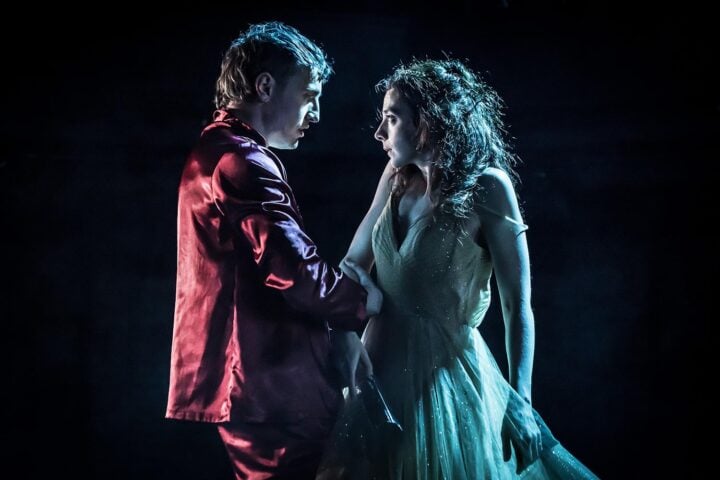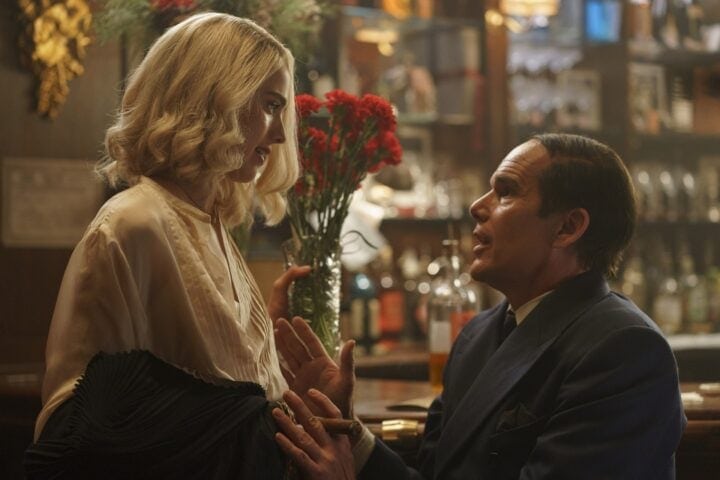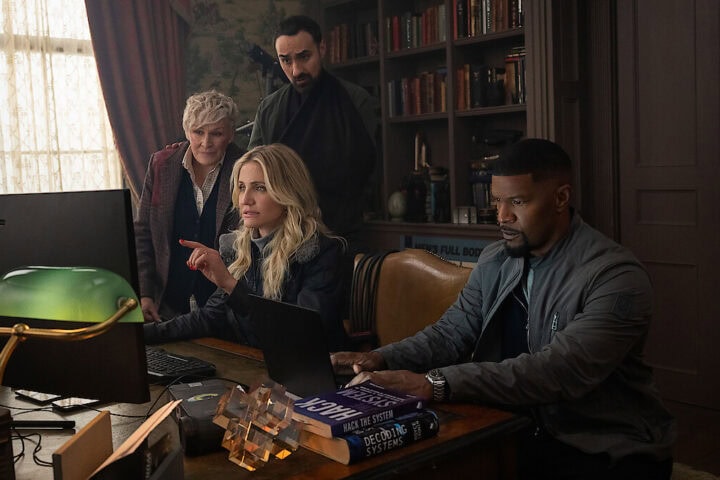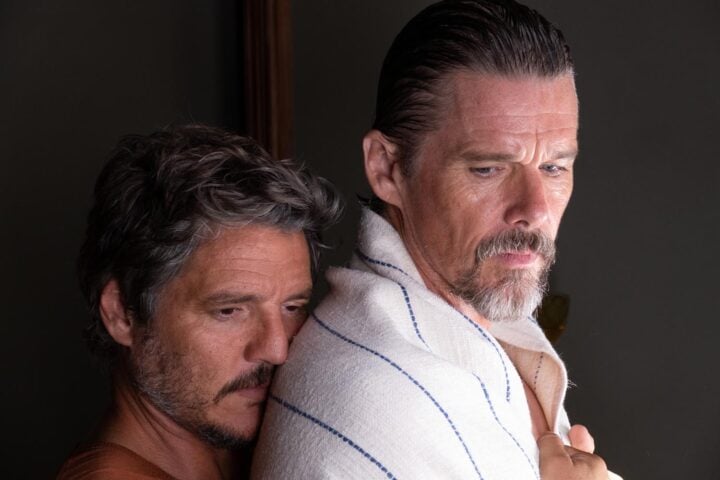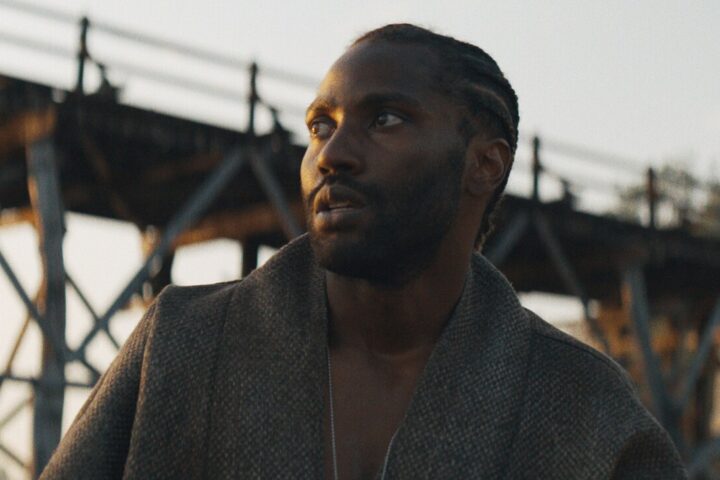In 2022, then-Vox writer Emily St. James coined a catchy phrase to describe an emerging cinematic trend: the “millennial parental apology fantasy.” Daniels’s Everything Everywhere All at Once and Domee Shi’s Turning Red represented the tip of the spear for a cohort of films, usually with explicitly or understood queer themes, that sought to reverse the tide of intergenerational trauma by demanding expiation from its source. Just a year later, however, All of Us Strangers proves that St. James’s term has already outlived its usefulness, what with 1970s-born writer-director Andrew Haigh and star Andrew Scott demonstrating that the dream isn’t exclusively the provenance of a single generation.
Haigh transposes and queers Yamada Taichi’s 1987 novel Strangers to contemporary London, where Scott’s reserved screenwriter, Adam, dwells in a new and largely unoccupied tower block. From outside the building one evening, he peers curiously into the only other tenanted unit. Adam gets quite the shock when the plainspoken Harry (Paul Mescal) recognizes and reciprocates his longing gaze by knocking on his door with a romantic entreaty. In spite of the obvious attraction engendered by the friendly but firm flirtations, Adam rebuffs his neighbor’s advances and withdraws into his own mind to understand his instinct for asceticism.
Such reeling leads Adam back to the childhood relics stowed neatly under his bed, just as they’re compartmentalized in his head. Recognizing his past as an impediment to happiness, he travels back to the home of his youth. There he finds his parents (Jamie Bell and Claire Foy), seemingly alive just as they were before the car crash that took their lives when Adam was 12. They see him now as the adult he is, but as one furtive glimpse into a mirror reveals, Adam still sees himself as the closeted adolescent who never got a chance to know—or be known to—his parents.
Once the disbelief of their improbable reunion wears off, the real work of healing can begin through the conversations the trio never got to have. These low-stakes hypotheticals are played for a bit of light laughter as the parents from the era of Thatcher and AIDS learn about contemporary LGBTQ experience. Bell and Foy imbue their characters with an aching understanding that prevents them from feeling like mere set decoration. They also cast the tensions within Scott’s anguished performance into intriguing relief, as Adam’s repression appears as both a learned behavior and a trauma response when seen opposite his parents.
In typical Haigh fashion, these casual chats between loved ones are soulful. They’re also disappointingly simple. The film offers something of a “greatest hits” album of the coming-out canon, from the initial state of shock to the tentative acceptance to the earnestly vocalized regret over a lack of support. No amount of mysticism can make these touchstones feel new again.
Whether it’s the fade-heavy editing style of Jonathan Alberts or the ethereal colors of Jamie D. Ramsay’s cinematography, All of Us Strangers always feels perched on the precipice of unlocking a deeper register. Yet Haigh remains content to linger in a purely therapeutic mode, offering counsel and comfort to Adam—and hopefully the audience by extension of their spectatorship. Individual scenes can pack real emotional wallops as the restrained performances create tension with the evocative moods conjured by Haigh’s direction. But the film dilutes these moments by building toward a predictable, if nonetheless powerful, catharsis.
Haigh has more surprises up his sleeve in the budding romance between Adam and Harry, which begins to blossom as the former man unpacks his childhood traumas. All of Us Strangers refuses to indulge an “it gets better” fantasy by pretending contemporary urban spaces and millennial openness are signs of inevitable progress. Even as Adam vanquishes certain demons specific to the time of his youth, Harry’s nonchalant acknowledgement of his estrangement from his nominally accepting family points to a queer dislocation that still persists.
Harry feels a bit flimsy and functionary as a character in All of Us Strangers, at times veering on an embodiment of all the internet boyfriend fantasies that have been projected on Mescal. (The film’s third act, to be fair, has some explanations for this.) But even in this capacity, he’s still responsible for sparking the conversations necessary to grapple with the questions raised by the concept. For Adam, it’s impossible to untangle the grief over the loss of his parents with the coyness about his sexuality. The candor and compassion with which Harry approaches his neighbor prompts the slow realization that any form of love is knotty by definition.
When focusing on their sensual and spiritual connection, Haigh allows himself to put aside some of the magical realism and rediscover the magic of realism that powered such incisive love stories as Weekend and 45 Years. The seduction leading up to Adam and Harry’s first sexual encounter is as poignant as any scene in Haigh’s filmography. As the two men struggle to find the verbal and physical language to express what they both want but cannot articulate, the scene proceeds with tactile attention to each tentative shift in their demeanor. While no moment that follows is nearly as sensational, Mescal’s extraordinary capacity for empathetic, reactive listening leaves his sections of the film littered with gently accentuating grace notes.
It’s fitting that, on a lazy day in his flat, Adam’s stray glance should catch Harry reading Henry David Thoreau’s Walden. Nearly two centuries after the publication of that transcendentalist classic, Haigh shows how humanity still must grapple with the complexities and contradictions of self-reliance. The bookending shots of the romantic and poetic All of Us Strangers frame life in celestial terms as it rises alongside the sun to shine briefly and brightly before it must return to the stars. The only thing certain in that time is the self, and to love while you can.
Since 2001, we've brought you uncompromising, candid takes on the world of film, music, television, video games, theater, and more. Independently owned and operated publications like Slant have been hit hard in recent years, but we’re committed to keeping our content free and accessible—meaning no paywalls or fees.
If you like what we do, please consider subscribing to our Patreon or making a donation.


